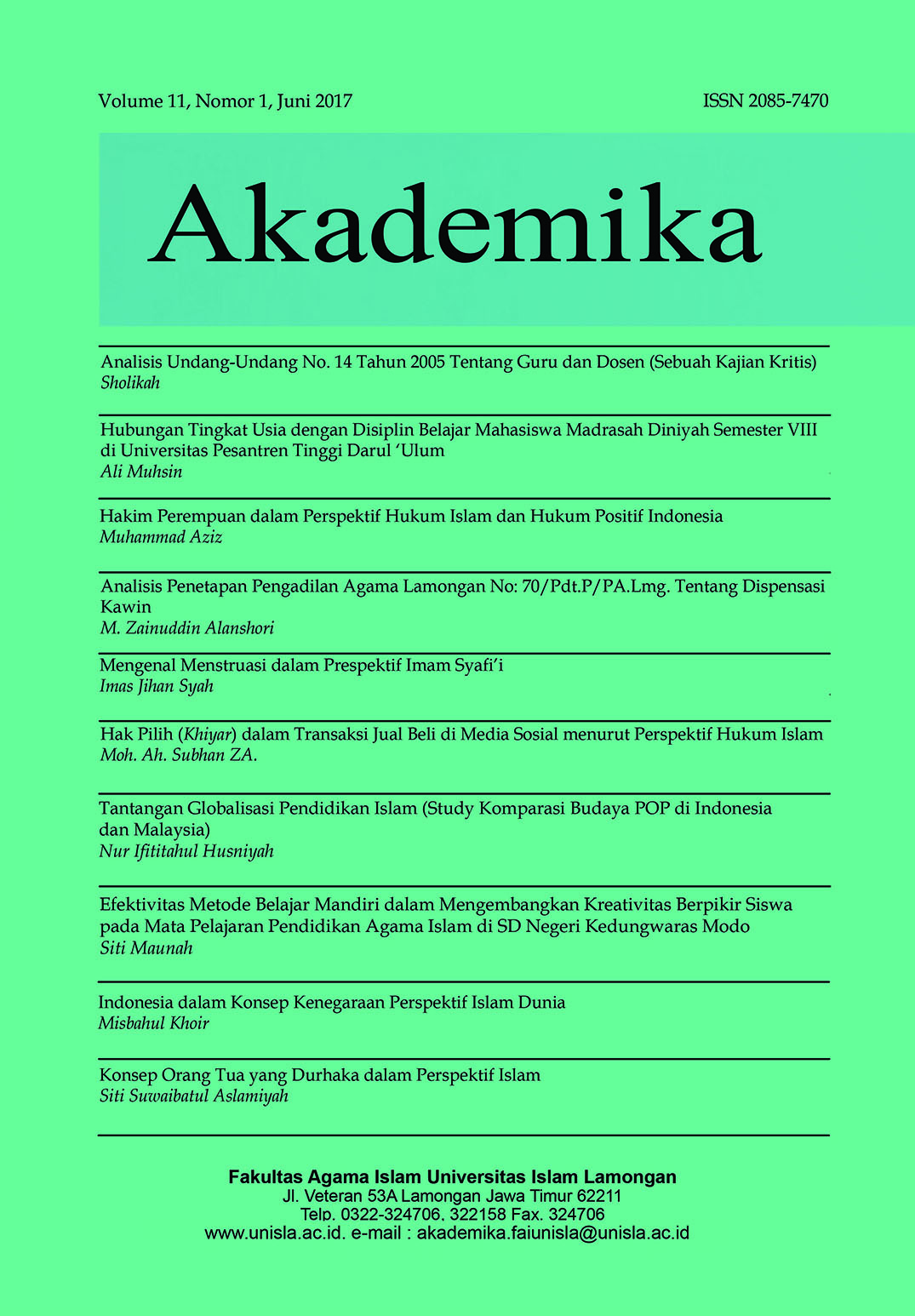HAKIM PEREMPUAN DALAM PERSPEKTIF HUKUM ISLAM DAN HUKUM POSITIF INDONESIA
DOI:
https://doi.org/10.30736/adk.v11i01.154Keywords:
Female judges, Islamic law, Fiqh, and positive lawAbstract
The judicial institution in a country is very strategic and decisive one for being used to resolve all public disputes and punish those who violate the law in accordance with the emering rules. This judicial institution is needed in an effort to answer and solve all social problems along with the development and the dynamics in the community. A judge is an authority aimed at resolving the various conflicts and creating justice for the community, and judges are leading actors in solving the problems. Therefore judges in acting and taking decisions must be based on so-called ijtihad. The phenomenon of women's involvement as judges in administering judicial power in the Religious Courts has undergone several phases of change. This condition is strongly influenced by the striking discrepancy of fiqh viewpoints about the religious (syar'i) legality in looking at women in the public sphere, especially in the judiciary. One of the reasons of Muslim scholars in questioning the female judges is due to their duties and responsibilities. On this stand, the Muslim scholars, thingkers and mujtahid have their own points of view that are different from one another. This refusal does not mean ignoring the judicial institution, but rather they consider it fardhu kifayah. Therefore, what is to be revealed in this study is the Islamic law and Indonesian positive law perspectives about female judges. This study concludes that the study of female judges in the perspectives of Islamic law is polarized on several permitting and prohibiting poles and the ones permitting women to serve as judges are only in their involvement in civil cases not in criminal ones. While based on the perspective of Indonesian positive law the female judges are a must in the legal treasures in Indonesia.
Downloads
References
Abu Faris, Muhammad ‘Abd. Al-Qadir. al-Qadha fil Islam, Aman: Dar al-Furqan 1984.
Al Ghazali, Abu Hamid. Al Mustashfa min Ilmil Ushul, Beirut: Daar al Kutub al ‘Ilmiyah, tt.
al-‘Asqalany, Shihab ad-Din Ahmad bin Ali Muhammad bin Muhammad bin Ali al-Kanany. al-Ishabah fi Tamyiz ash-Shahabah, j. 4, Bairut: Dar al-Kutub al-‘Arabiyyah, tt.
Al-Ansari, Abi Yahya Zakaria, Fathul Wahab. t.tp.: Dar al-Fikr, tt.
Al-asqalani, Ibn Hajar. Fathu al-Bari Sharah Shahih Bukhari, jilid III, Mesir: Bab al-Halabi, tt.
al-Baji, al-Muntaqa Syarh Muwatha’ al-Imam Malik, j. 5, Bairut: Dar al-Kitab al-‘Araby 1331.
al-Bakr, Muhammad ‘Abd. Rahman. al-Sultan al-Qadaiyyah wa Syahsiyah al-Qadi fi al- Nizam al-Islam, Kaheran: al-Zahirahli al-I’lamal-‘Arabi, tt.
Al-Dimyati, Abu Bakr Sayyid al-Bakri ibn al-Sayyid Muhammad Syatha. I'anah al-Thalibin. t.tp.: Dar al-Fikr, tt.
al-Gazwani, Al-Hafidz Abi Abdillah Muhammad bin Yazid. Sunan Ibn Majah, jilid II, Mesir: Matba’ah Isa al-Bab al-Halabi, tt.
Ali, Zainudin. Hukum Islam: Pengantar Hukum Islam di Indonesia, Jakarta: Sinar Grafika, 2006.
Al-Mawardi, Adab al-Qadha, (Bairut: Dar al-Fikr, tt).
Al-Mawardi, Al-Ahkam al-Sulthaniyah, Bairut: Dar al-Fikr, tt.
Al-Shirazi, Abu Ishaq Ibrahim ibn Ali ibn Yusuf. Al-Muhadzdhab, Beirut: Dar al-Fikr, tt.
Ash Shiddiqie, Teungku Muhammad Hasbi. Peradilan dan Hukum Acara Islam, Semarang: Pustaka Rizki Putra, 1997.
az-Zuhaili, Wahbah. al-Fiqh al-Islamy wa Adillatuh, Damaskus: Dar al-Fikr, 1989.
Battaji, Muhammad, Makna al-Mar’ah fi al-Qur’an al-Karim wa al-Sunnah al-Shahihah, Bairut: Dar as-Salam, tt.
bin Ahmad, Ibn Qudamah. Al-Mughni, Bairut: Dar al-Fikr, 1405 H.
Bisri, Cik Hasan. Peradilan Agama di Indonesia, Jakarta: PT. Raja Grafindo Persada, 2000.
Dahlan, Abdul Aziz (ed). Ensklopedi Hukum Islam, cet. Ke-1, Jakarta: PT Ikhtiar Baru Van Hoeve, 1996.
Ibn Rusyd, Bidayah al-Mujtahid wa Nihayatul Muqtashid, Kairo: Mesir, Mathba’ah Mushtafa al- Babi al-Halabi, tt.
Ibnu Hammam. Mu’in al-Hukkam Fima Yataraddadu Baina al-Khasamain min al-Ahkam, j. 7, Mesir: Maktabah al-Musthafa al-Bab al-Halabi wa Auladuh,1973.
Madzkur, Muhammad Salam. al-Qadha Fi al-Islam, terjemahan Imron AM dengan judul Peradilan dalam Islam, Surabaya: PT Bina Ilmu, 1993.
Manan, Abdul. Etika Hakim dalam Penyelenggaraan Peradilan, Suatu Kajian dalam Peradilan Islam, Jakarta : Kencana, 2007.
Munawwir, Ahmad Warson, Kamus al-Munawwir Arab-Indonesia, Surabaya: Pustaka Progresif, 1997.
Muqadas, Djazimah. Kontroversi Hakim Perempuan Pada peradilan Islam di Negara-Negara Muslim, Yogyakarta : LKiS, 2001.
Muqoddas, Djazimah. Perempuan Pada peradilan Islam di Negara-Negara Muslim, Yogyakarta: LKiS, 2001.
Thahar, Kamarisah. Hak Asasi Perempuan dalam Islam, Medan: Ofset Maju, 1982.
UU RI No. 14 tahun 1970 tentang Ketentuan Pokok Kekuasaan Kehakiman, Bab I pasal 2 ayat 1
Zaidan, Abd al-Karim. Nizam al-Qada’ fi al-Syari’ah al-Islamiyyah, Baghdad: Matba’ah al-‘Aini, 1984.














